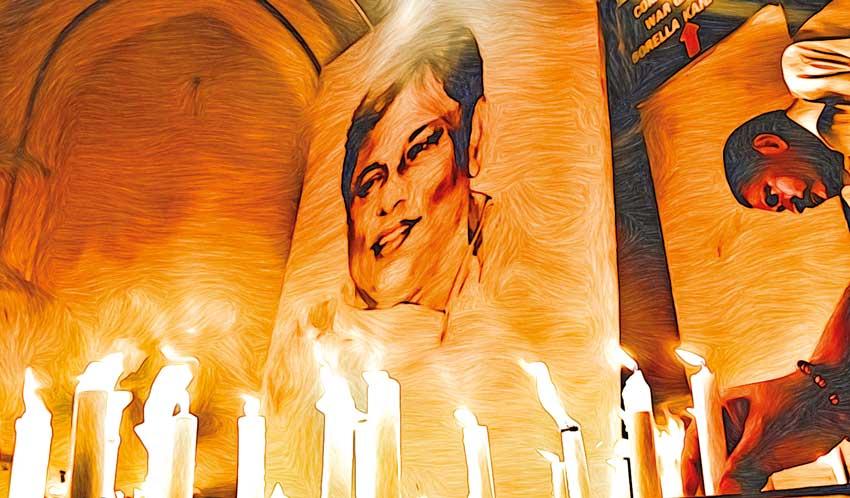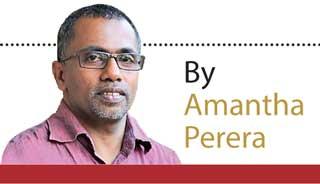05 Jan 2023 - {{hitsCtrl.values.hits}}

“Honour is purchased by the deeds we do”
-Christopher Marlowe
 The voice would boom through the corridors, “Hey bugger, what have you got for me?” Early morning hours during a mid-weekday in a Sunday newspaper and few staffers were just ambling in. I would be among them; most often returning to the office after several days spent on reporting.
The voice would boom through the corridors, “Hey bugger, what have you got for me?” Early morning hours during a mid-weekday in a Sunday newspaper and few staffers were just ambling in. I would be among them; most often returning to the office after several days spent on reporting.
Lasantha had a habit of never calling you during assignments. As far as I can remember I had received one such call during my decade of service at The Sunday Leader. That was during a goon attack on journalists in Colombo. He rarely wanted details of the reporting. What he wanted, however, was the story in one short sentence.
It has been 14 years since he was waylaid in Ratmalana and killed. In those 14 years, his influence on my life and career has been far greater than before. Last year I wrote my first 30,000-word academic dissertation and dedicated it to him and my parents.
I still remember what happened to me when I first heard he was attacked. I instinctively grabbed a camera. I have 100s of photographs from the murder site to the funeral; 100s of them. I have often wondered why I did this. It took me years to finally realise why. The camera was like a shield to me. I was scared, I was nervous and I was in no emotional state to report this heinous crime which was very personal to me. But I did not know any of this then. For years, I reported on the murder investigation. The more I reported, the angrier I became. I became angry at him for being so imbecilic with his personal security, with those around him for cashing in on his legacy without any remorse and with me for letting him get attacked. It took me years to understand the deep traumatic impact of Lasantha’s murder. His murder was the start of my own journey into trying to understand the impact of what we report has on our lives.
It’s ironic that Lasantha would influence this. He was one of the machoest journalists I have encountered. He was a creation of the era he came through as a journalist; an era of derring-do journalism, but also almost religious-like abstinence from acknowledging vulnerabilities.
There was some great reporting. But there were also heavy prices paid; his death was one of them. Fourteen years after his murder we are pretty much aware of how the crime was carried out. But no one has been held responsible; maybe no one will ever be. Maybe that is part of the legacy, the mystery and the myth of the man.
Part of that myth is also the unacknowledged impact of the man on Sri Lankan journalism. Fourteen years after one of the top editors in the country was murdered, the Editors’ Guild of this country has still failed to recognise him formally: Again, part of the myth!
But Lasantha’s impact cannot be hidden so easily. So many of the senior journalists today got their first break under him whether they admit the fact or not.
His legacy is still being moulded. We don’t know the full story of this man who was so divisive in his journalism. So unabashedly biased in some of his reporting that by default they were some of the most transparent instances of journalism I have ever come across. Lasantha always reminded me that I would never survive five minutes in any other newspaper in Sri Lanka. Even with my limited interactions with newsrooms other than the Leader, I suspect this may be true. For all his faults and there were many, at least in those formative years of my career, Lasantha gave me the freedom to find my mojo. And when I did, which was reporting from far out places, he reluctantly loosened any editorial chains that would have thwarted me.
He once assigned me to report on parliament proceedings. The next step in a plan, that I suspect, he had was to put me through the layers of a political reporter. I did this for a year or so and it was the most boring reporting stint during my career; except for digging into all the parlour whispers. When I saw the opportunity to bail out of the gig, I wasted no time asking him. The look on his face read “you brat”. He relented, but on one condition that I had one page a week to fill in the main section with a story that would pass his ‘quality test’. And thus, that booming welcome to the office; sometimes accompanied by a loud whistle.
I have plenty for you Mr Wickrematunge, plenty.
And thank you for all that you have been for me.
One day the storyteller’s tale will be told, unbiased and unafraid.
The writer is a journalism researcher and the Project Lead at the Dart Centre Asia Pacific. He can be contacted on [email protected]
09 Jan 2025 1 hours ago
09 Jan 2025 2 hours ago
09 Jan 2025 2 hours ago
09 Jan 2025 2 hours ago
09 Jan 2025 2 hours ago